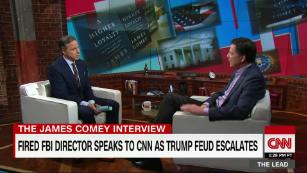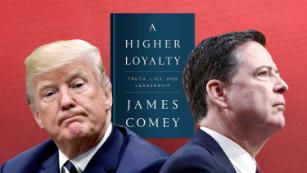begin quote from:
https://www.cnn.com/2018/04/19/opinions/comeys-unforgivable-error-lizza/
James Comey's unforgivable error
By Ryan Lizza
Updated 8:02 PM ET, Thu April 19, 2018
Ryan Lizza is a CNN Political Analyst. The opinions expressed in this commentary are solely those of the author.
(CNN)At the end of an interview with CNN Thursday afternoon, former FBI Director James Comey was asked by Jake Tapper about his unusual place in American politics as a man equally "reviled" by partisans of both Hillary Clinton and Donald Trump.

Clinton's most ardent supporters insist Comey had it in for their candidate in 2016 when, in the final weeks of the campaign, he told Congress that the feds had reopened their investigation into Clinton's emails to conduct a search of Anthony Weiner's laptop. The rage is understandable: There's solid statistical evidence that the Comey announcement tipped the campaign to Trump (see Nate Silver's analysis, "The Comey Letter Probably Cost Clinton the Election," for the full argument.) John Podesta, Hillary Clinton's campaign chairman, recently said on CNN that he doubted Clinton could even bring herself to read Comey's book.
Trump partisans revile Comey for the Russia investigation, for forcing the Justice Department to appoint a special counsel, which has served as a tightening noose around Trump's presidency, and for Comey's scorching portrait of the President, who has dubbed Comey a liar who should be jailed.
Comey reacted to Tapper's question by noting that America's heightened polarization has made the job of the FBI director historically difficult.
"The challenge of being the FBI in today's political environment," he said, "is you're not on anybody's side. That confuses people, which I get. And it angers people, which I also get. And there's only so much you can do about it, except constantly try to show transparency. Show people your work. So that fair-minded people can make a judgment."
This idea of transparency is a major thread through Comey's book, "A Higher Loyalty."
"Buried pain never gets better with age," he writes. "And by remembering and being open and truthful about our mistakes, we reduce the chance we will repeat them."
In many ways Comey, in his book and on his media tour, has indeed been transparent and self-reflective. But in the Tapper interview he once again demonstrated an enormous blind spot about his role in the election. He remains supremely confident that he did the right thing by disclosing the Clinton email investigation while hiding the Russia investigation.
As a journalist I've never bought the argument from Clinton partisans that Comey should not have revealed the reopening of the email investigation. Comey found himself in a difficult position. President Barack Obama had made statements about the investigation that were arguably inappropriate for a president. Bill Clinton and Loretta Lynch, the attorney general, had had a mysterious meeting on Lynch's plane. If Comey hadn't disclosed, the information surely would have leaked.
Comey has said he thought at the time, "If I hide this from the American people, she'll be illegitimate the moment she's elected." He was right. Voters going to the polls deserved to know whether Clinton was under investigation. (If the Democrats didn't want an FBI investigation to be part of the campaign, they could have nominated someone who wasn't under FBI investigation.)
But wait: Trump associates were also under investigation at the same time, as part of the Russia probe, which began in July of 2016. It is unforgivable for Comey to argue that the principle of transparency required him to disclose an investigation affecting one candidate but not the other.
Asked about this discrepancy, Comey gave an inadequate answer.
"I think of the two investigations -- and everybody working on it in the Department of Justice and the FBI did, as well -- as quite different," he said. "Very early-stage counterintelligence investigation of Americans, not Donald Trump, a small group trying to figure out, is there any connection of those people and the Russian effort? Separate from the Russian effort, which we had important discussions about whether to publicize that."
He added that "it wouldn't be remotely appropriate" to reveal any facts about the Russia investigation. And yet, as Tapper pointed out, Comey did just that, only it occurred five months later in a public hearing before Congress.
Sure, the investigation was further along by then, but not by very much. Comey insisted to Tapper that he was pressured by members of Congress, such as Republican Senator Chuck Grassley, to reveal the Russia probe, but the same was true during the campaign, when Harry Reid, the top Democrat in the Senate, pushed Comey to disclose the existence of the Russia investigation.
In late October, Reid wrote to Comey that "you possess explosive information about close ties and coordination between Donald Trump, his top advisers, and the Russian government." Reid was mocked as a bit of a conspiracy theorist at the time. But we now know he was mostly right.
Comey should have set the record straight in 2016 -- and while he's lecturing everyone about transparency on his current media tour, he should admit he was wrong not to.








No comments:
Post a Comment